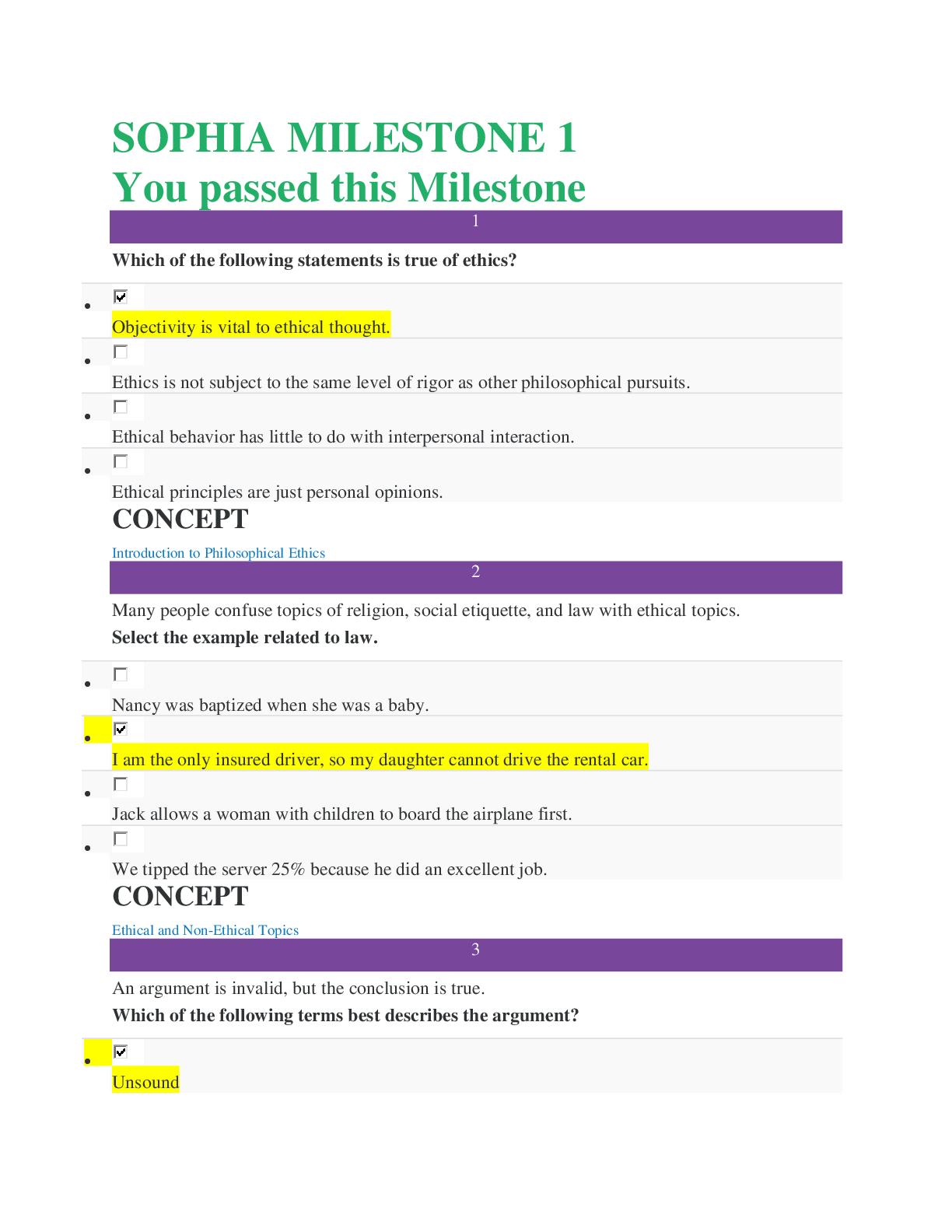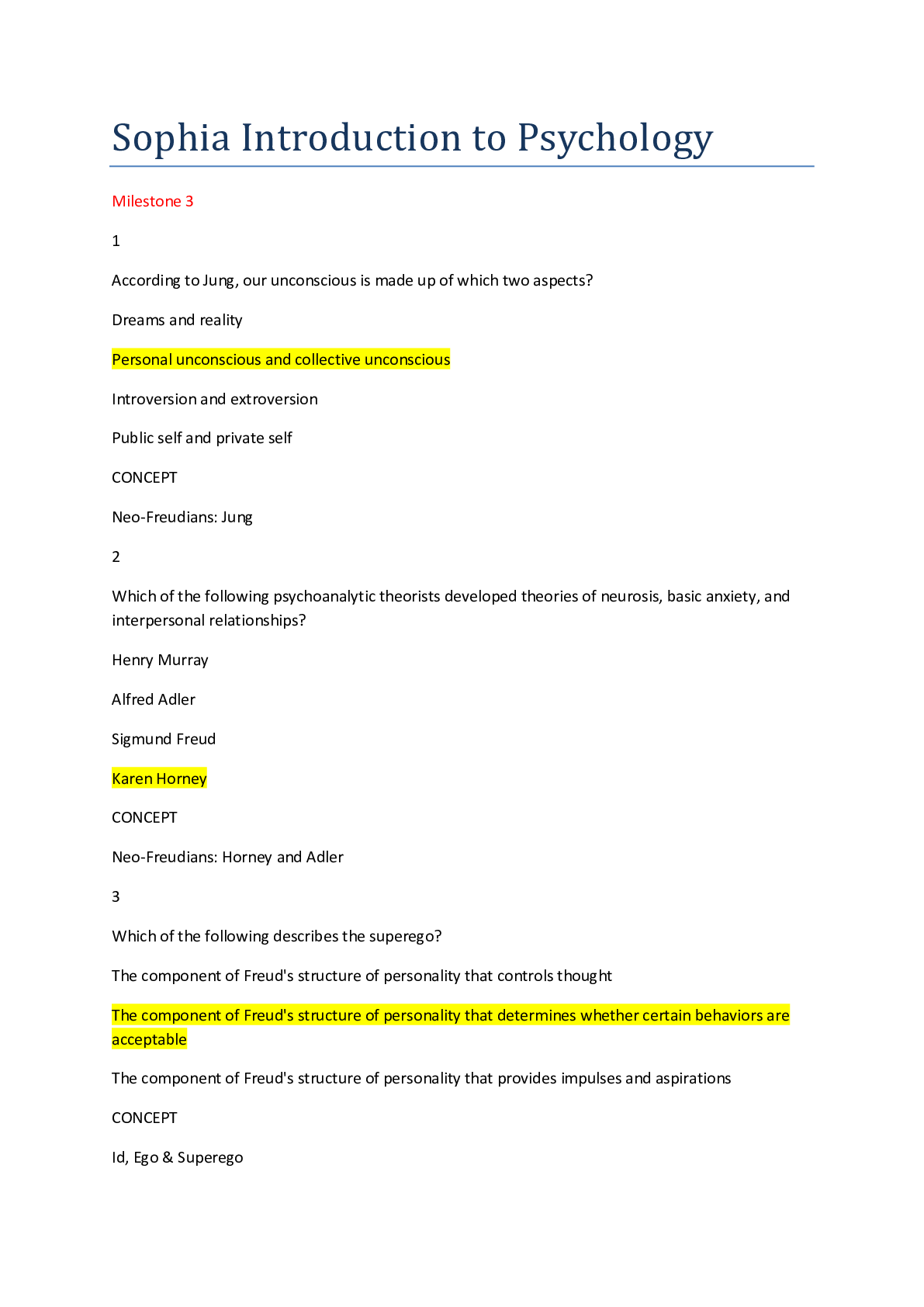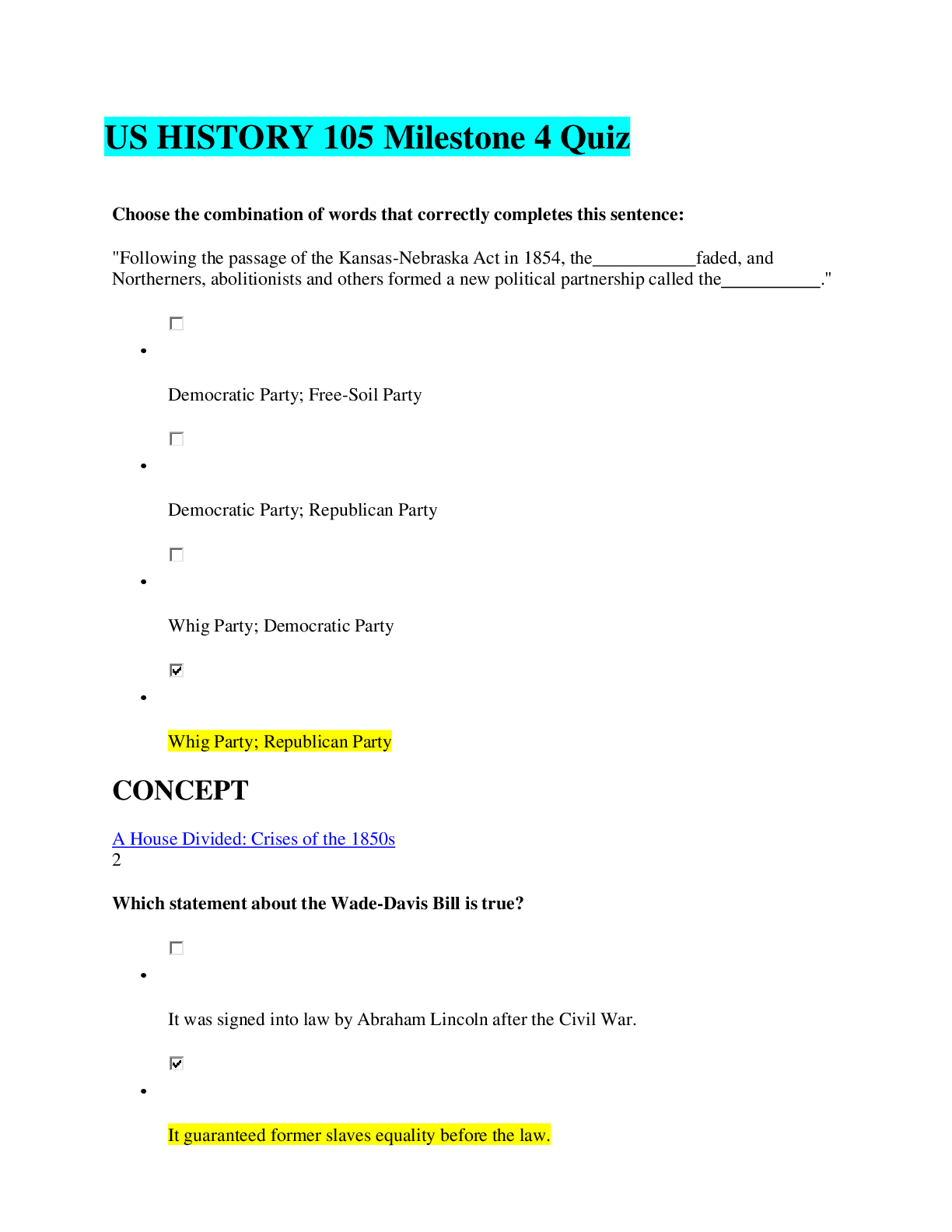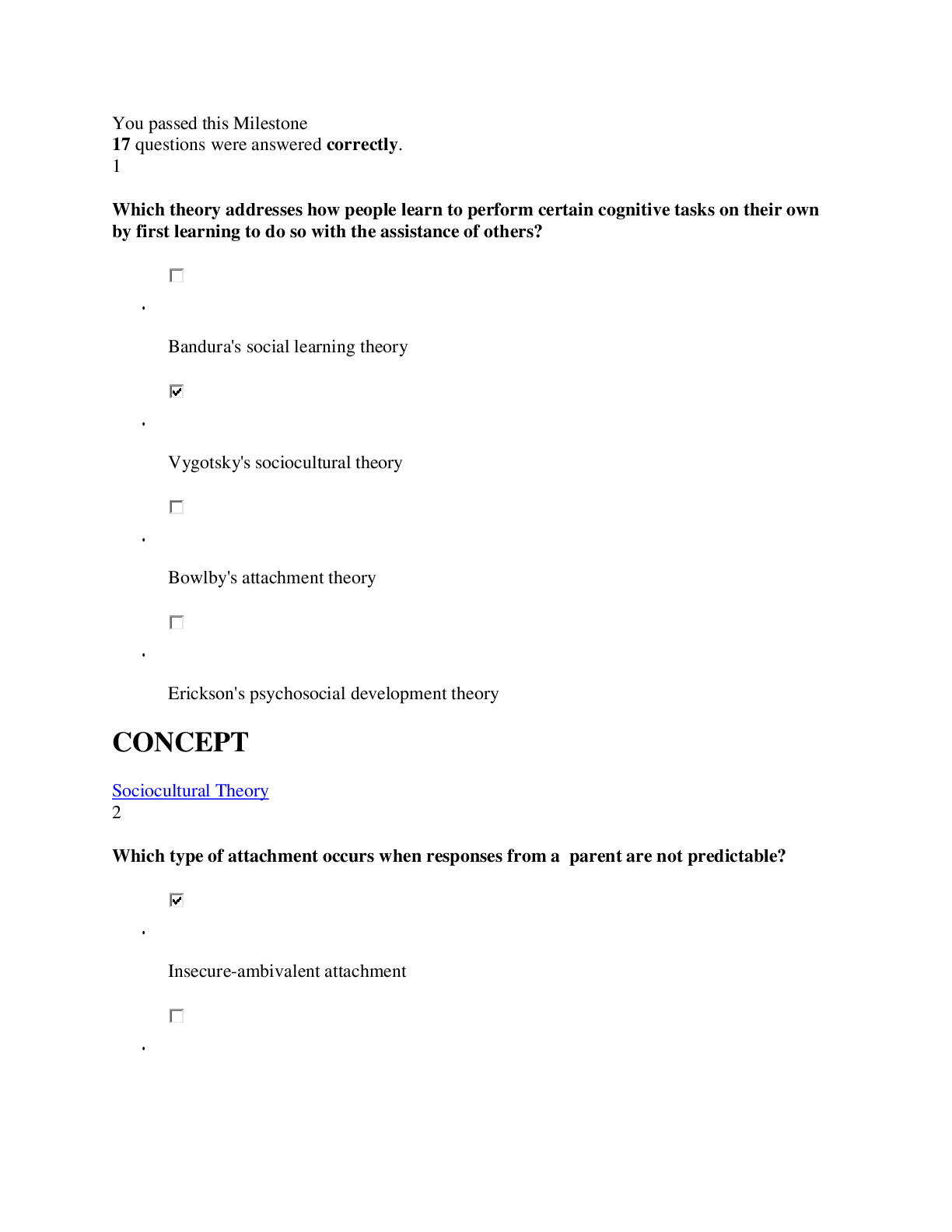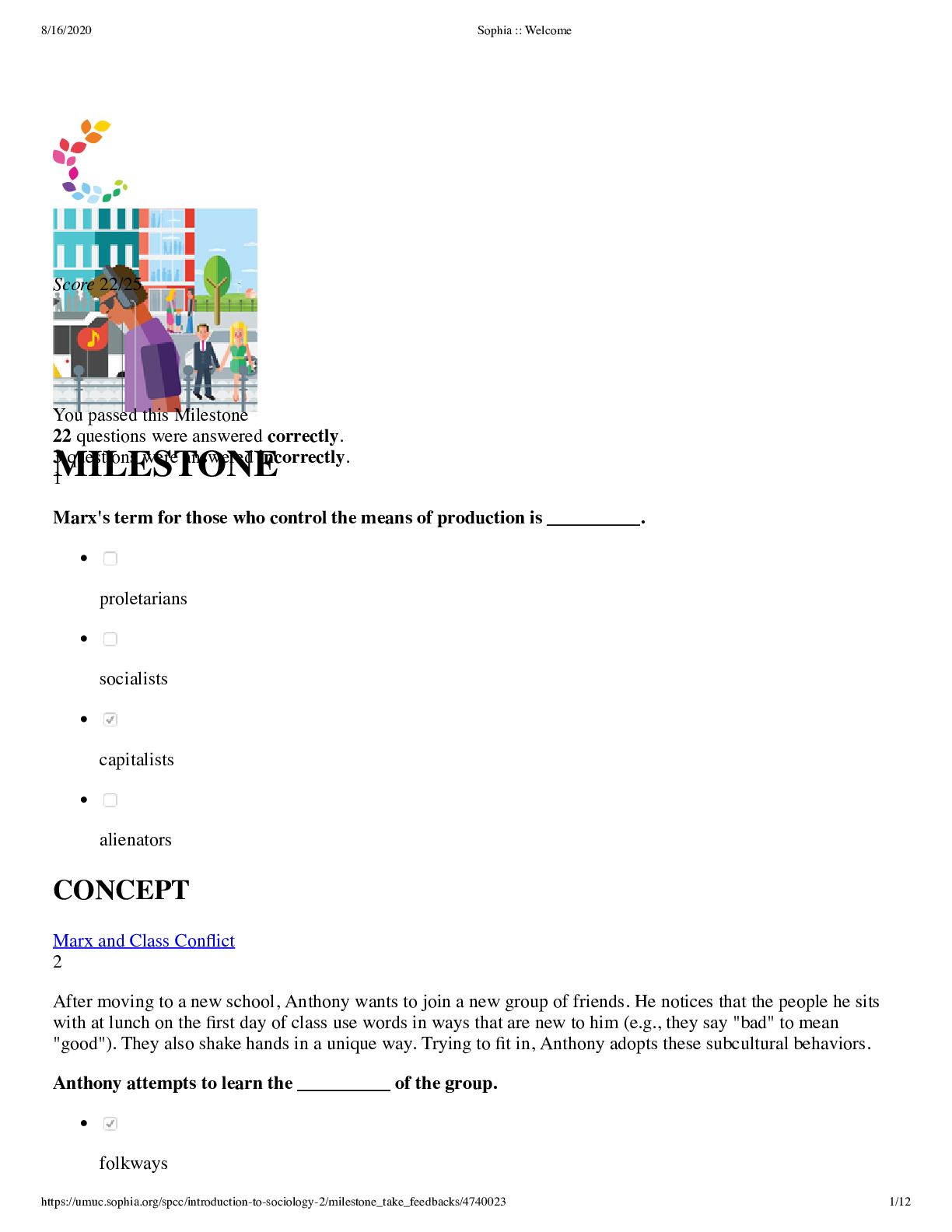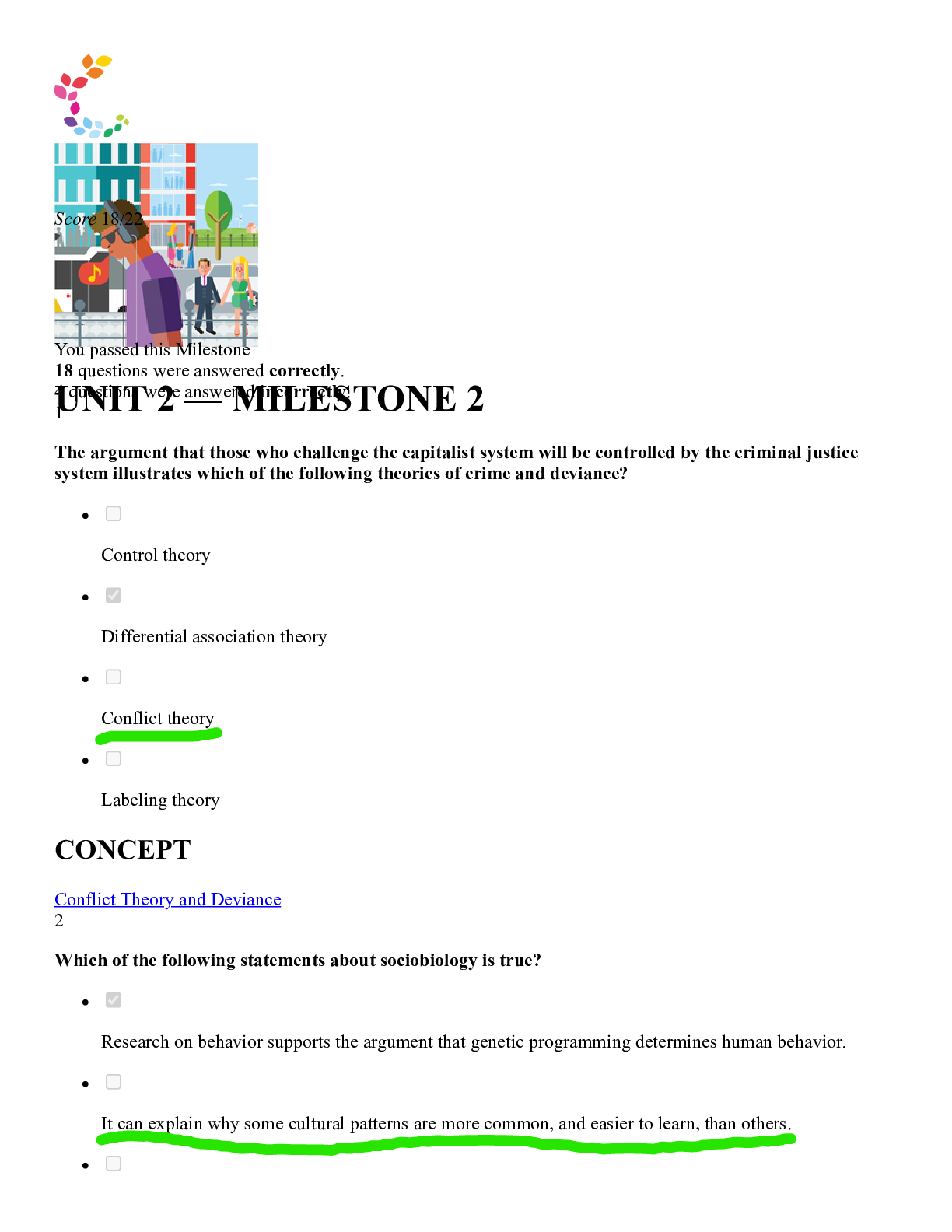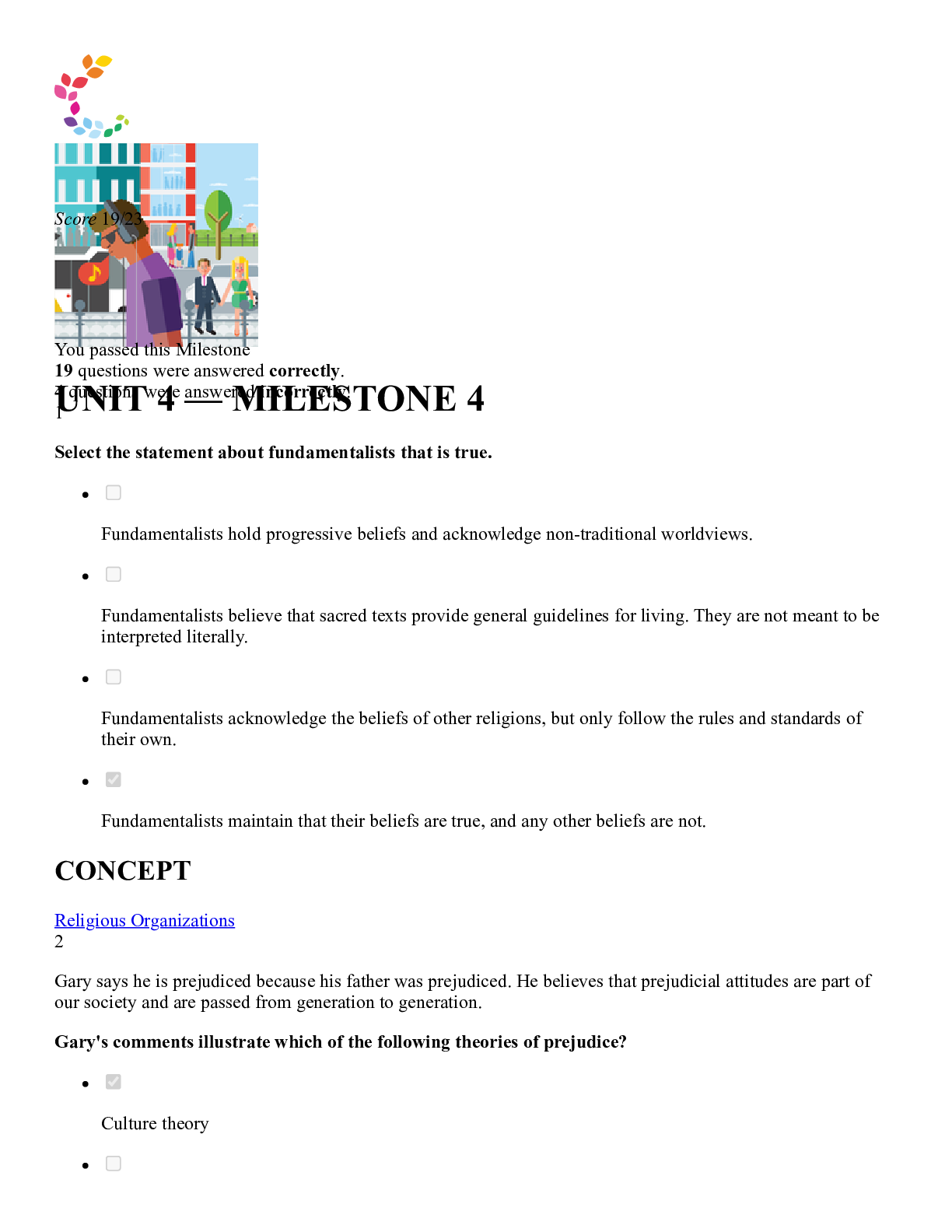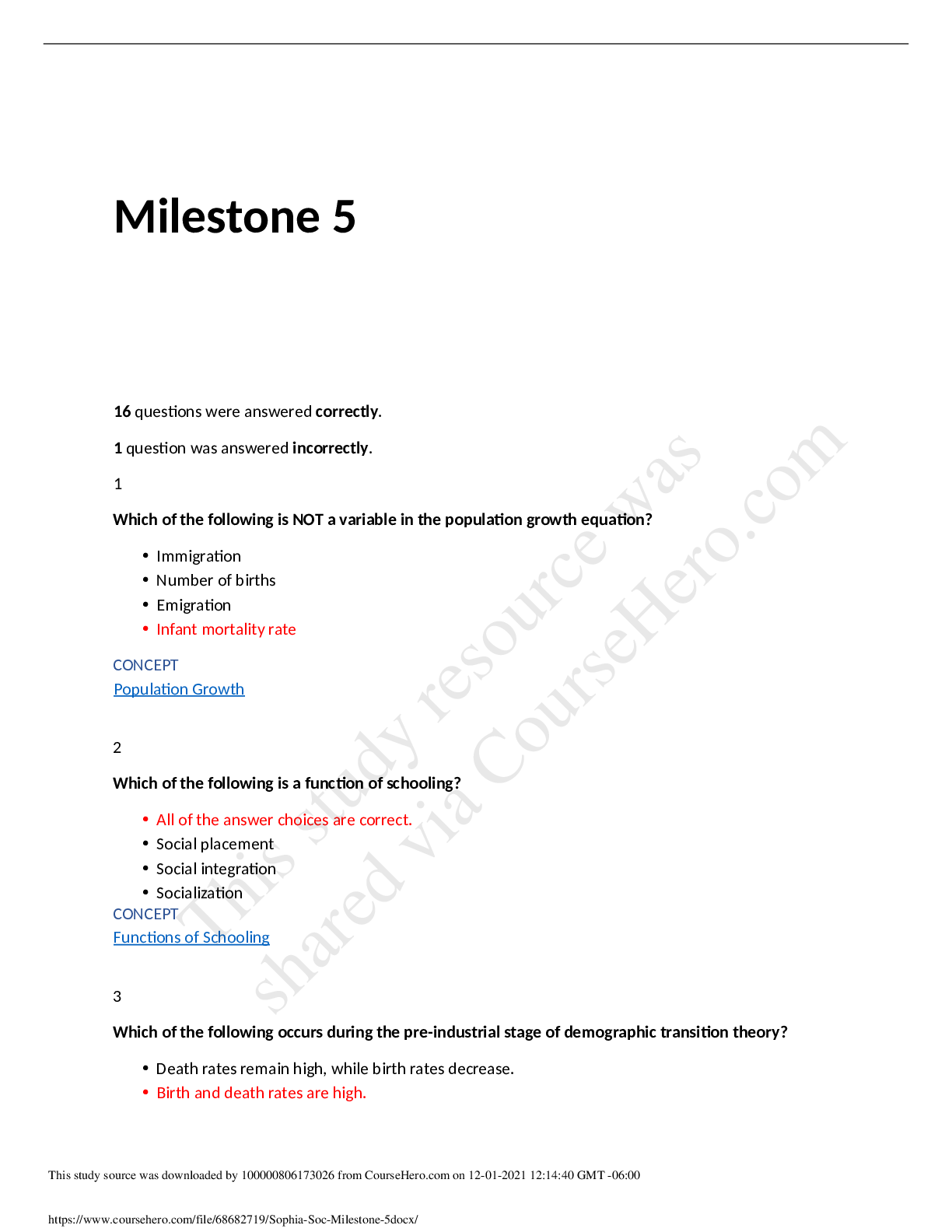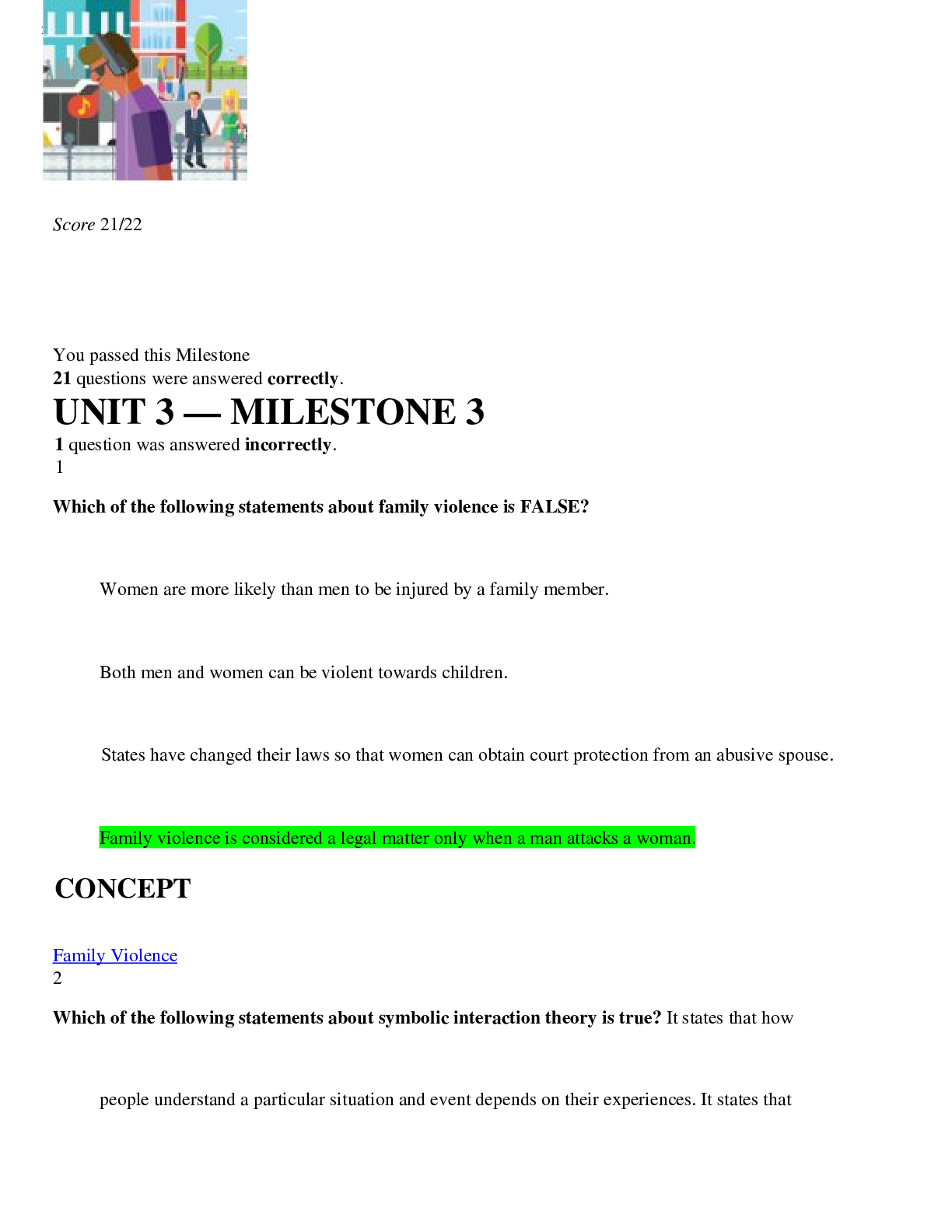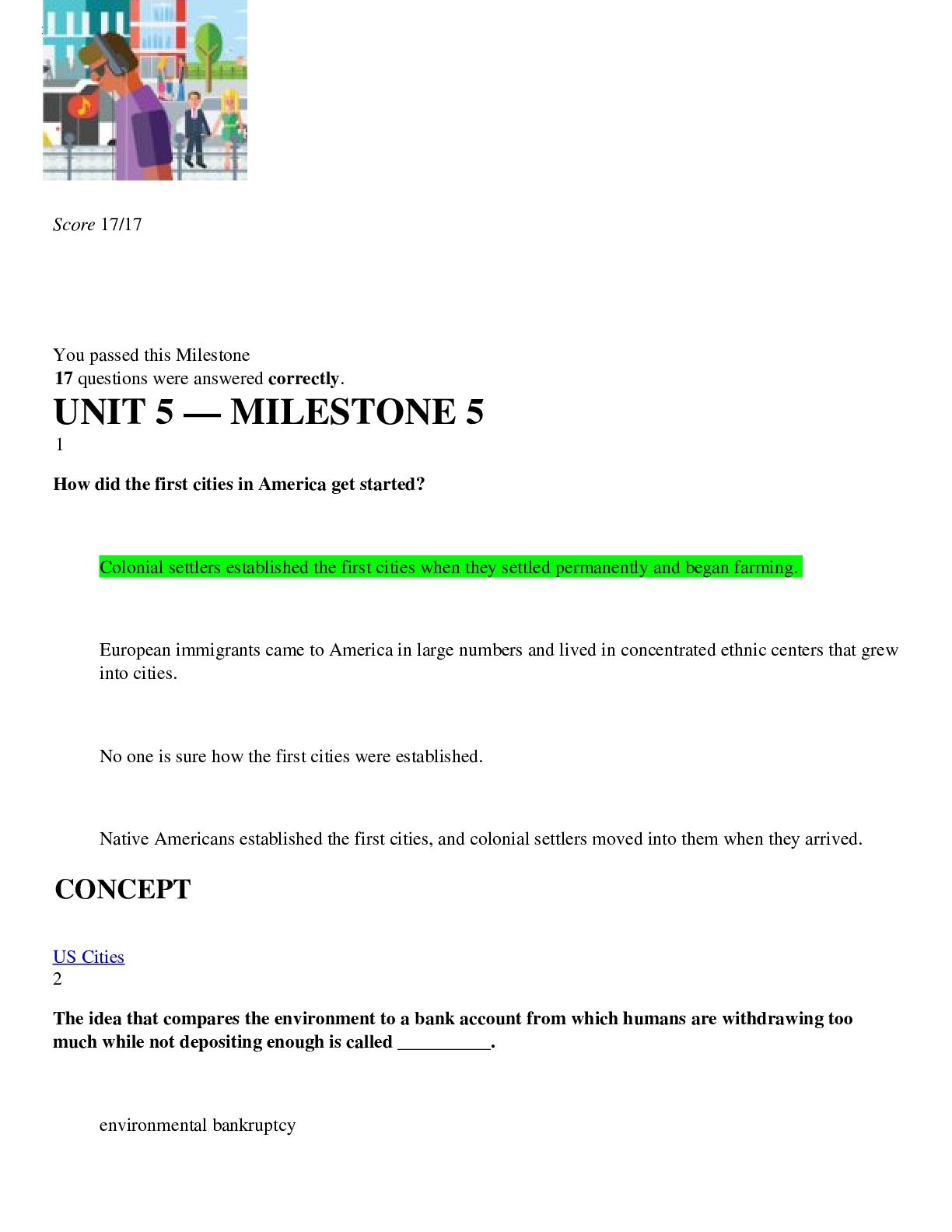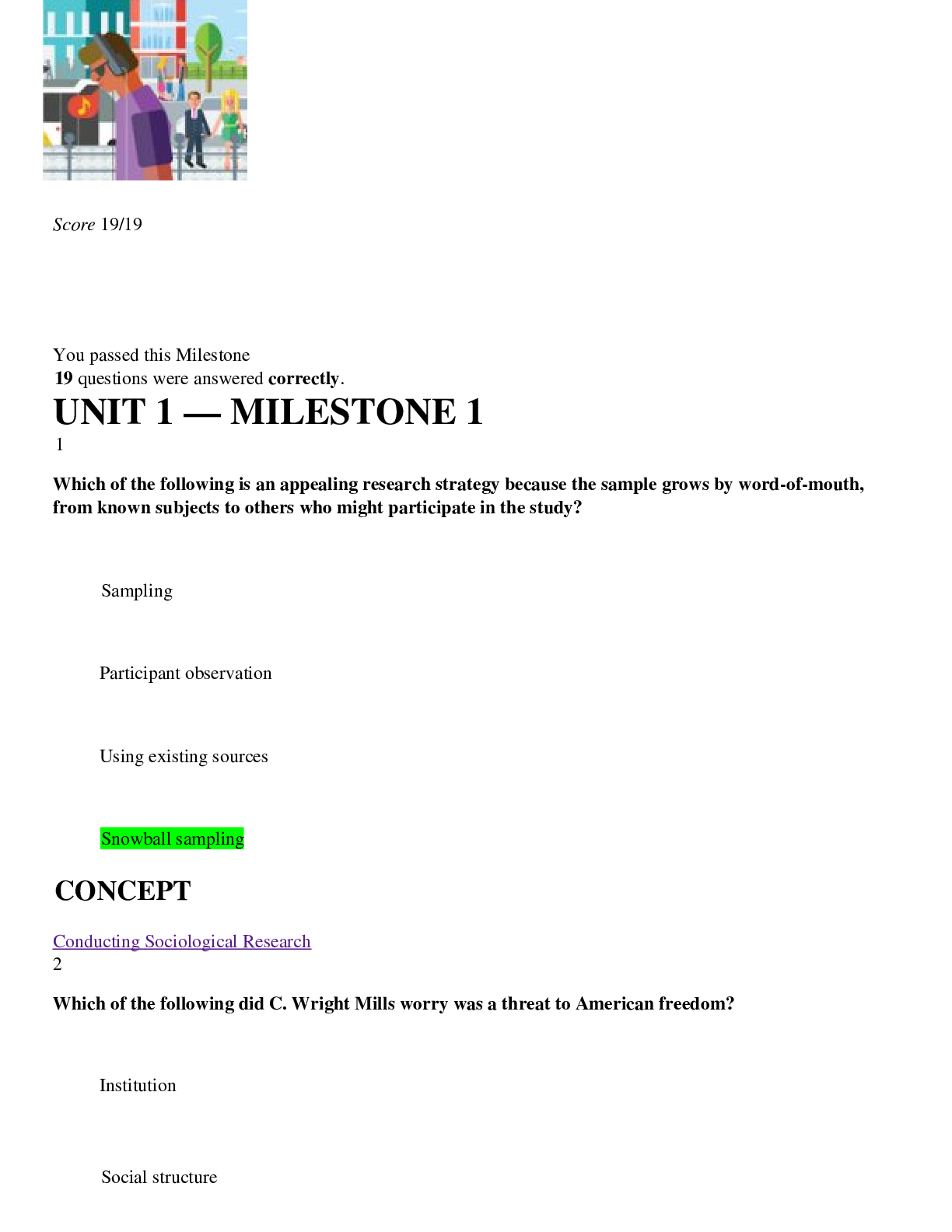Psychology > SOPHIA Milestone > PSYCHOLOGY SOPHIA MILESTONE: PSYC101 Milestone 6. Exam Review. 100% Score. (All)
PSYCHOLOGY SOPHIA MILESTONE: PSYC101 Milestone 6. Exam Review. 100% Score.
Document Content and Description Below
PSYCHOLOGY SOPHIA MILESTONE: PSYC101 Milestone 6 Dissociative identity disorder is characterized by which of the following symptoms? • Having several different, distinct personalities that are o... bserved at different times • Losing the ability to recognize familiar faces, while retaining memory and identity • Losing part or all of one's memory related to one's sense of identity • Experiencing temporary, reversible memory loss that involves wandering and the possible establishment of a new personality CONCEPT Dissociative Disorders 2 Paranoia is a state of __________ in which individuals believe that they are being persecuted by others. • delusion • psychosis • hallucination • insanity CONCEPT Psychotic Disorders 3 Which of the following is a type of conflict in which a person wants to do or have something, but doesn’t like certain aspects of it? • Avoidance-avoidance conflict • Appreciation-apperception conflict • Approach-approach conflict • Approach-avoidance conflict CONCEPT Conflict 4 Which of the following is a sexual disorder? • Dysthymic disorder • Somatization disorder • Dissociative identity disorder • Dendrophilia disorder CONCEPT Sexual, Gender Identity, and Substance-Related Disorder 5 Eleanor is in psychotherapy, where she is learning to cope with stress. As part of this process, she works to recognize the ways in which she criticizes herself so that she can replace negative thought patterns with positive information. Which of the following terms refers to critical and harmful thoughts about oneself? • Negative self-statements • Defense mechanisms • Learned helplessness • Hypomania CONCEPT Specific Techniques of Coping with Stress 6 Long-term patterns in mental processes, emotions, or behavior that make day-to-day life difficult are categorized as __________ disorders. • emotional • social • adjustment • personality CONCEPT Mental Disorders Overview 7 __________ occurs when an individual is worn down as a result of prolonged stress on the job. • Burnout • Pressure • Resistance • General adaptation syndrome CONCEPT Stages of Stress and Psychoimmunology 8 Kenny is sad and distraught much of the time. Sometimes he feels so down that he is unable to get out of bed. He does not use alcohol or drugs — not even prescription medication. He is attending psychotherapy sessions. Kenny most likely has a type of which of the following? • Anxiety disorder • Dissociative disorder • Mood disorder • Substance-related disorder CONCEPT Mood and Bipolar Disorders 9 Which of the following is NOT a defense mechanism? • Projection • Rationalization • Aggression • Denial CONCEPT Psychological Defenses 10 __________ describes the mental injury or shock that results from events like natural disasters, the death of a loved one, physical assaults, or extreme stress. • Psychological trauma • Stress response • Psychopathy • Phobia CONCEPT Causes of Mental Disorders 11 Tisha has been worrying, and has had difficulty concentrating, for over a year. In addition, she often feels dizzy and irritable. Tisha is considering psychotherapy, but wonders if it is appropriate, since she has not had panic attacks and still goes to work. Her work performance has suffered, however, and her boss has spoken to her about it. Tisha is likely experiencing which of the following? • Generalized anxiety disorder • Panic disorder (without agoraphobia) • Panic disorder (with agoraphobia) • Agoraphobia (without panic disorder) CONCEPT Anxiety Disorders 12 All of the following are cognitive disorders EXCEPT __________. • Dementia • Amnesia • Delirium • Hypomania CONCEPT Cognitive and Organic Disorders 13 Betty laughs and spins in circles throughout much of the day. She cannot give meaningful answers to questions posed by her doctors. Instead, she discusses unrelated information in a way that is difficult to follow. Betty will most likely be diagnosed with which of the following? • Paranoid schizophrenia • Catatonic schizophrenia • Disorganized schizophrenia • Undifferentiated schizophrenia CONCEPT Schizophrenia 14 When a person is anxious for an extended period of time, he or she can become more susceptible to illness. This is called which of the following? • Biofeedback • Lifestyle disease • Stress-induced illness • Behavioral risk factor CONCEPT Health Psychology 15 Tammy is frustrated at work. She has been passed over for a promotion several times, despite outstanding job performance reviews. After she arrives home following the latest rejection, she yells at her husband for not cleaning up after dinner, even though it is not his turn to do so. This type of behavior is an example of which of the following? • Aggression • Scapegoating • Displaced aggression • Escape CONCEPT Frustration 16 Hypochondriasis, pain disorder, and conversion disorder are categorized by the Diagnostic and Statistical Manual of Mental Disorders as __________ disorders. • somatoform • organic • cognitive • dissociative CONCEPT Somatoform Disorders 17 Insanity is a legal term for the __________ of individuals, and how responsible they are for their actions. • mental illness • mania • psychosis • mental fitness CONCEPT Abnormal Behaviors 18 Antonio completes a seven-minute routine before leaving his house. He checks seven times that his stove is off, checks seven times that the lights are off, and locks and re-locks his door seven times. If Antonio does not complete this routine, he becomes extremely anxious and worries that something might happen to his home while he is gone. Antonio would likely be diagnosed with which of the following? • Generalized anxiety disorder • Agoraphobia • Social phobia • Obsessive compulsive disorder CONCEPT Phobias and OCD 19 According to the DSM-IV, dysthymic disorder is a depressive disorder characterized by which of the following? • Moderate depressive symptoms that last for at least two years • Depressive symptoms that develop after giving birth • Deep depressive symptoms that last for at least two weeks • Depressive symptoms that are based on changes in the seasons CONCEPT Mood Depressive Disorders 20 A disorder in which a person experiences serious symptoms — including difficulty sleeping, irritability, and avoidance — that last a month or longer is called __________. • acute stress disorder • acculturative stress • non-traumatic stress • post-traumatic stress disorder CONCEPT Stress Disorders 21 An inherited form of depression, in which a person’s brain does not produce enough of certain neurotransmitters, is called __________ depression. • seasonal • manic • endogenous • postpartum [Show More]
Last updated: 1 year ago
Preview 1 out of 6 pages
Instant download

Buy this document to get the full access instantly
Instant Download Access after purchase
Add to cartInstant download
Reviews( 0 )
Document information
Connected school, study & course
About the document
Uploaded On
Dec 31, 2020
Number of pages
6
Written in
Additional information
This document has been written for:
Uploaded
Dec 31, 2020
Downloads
0
Views
75

